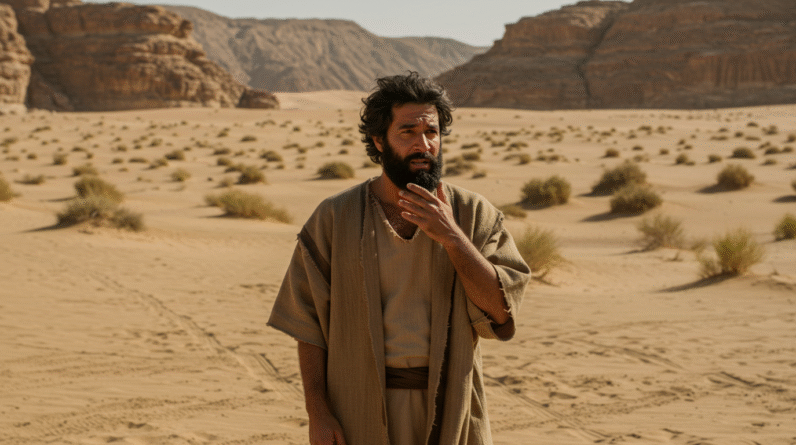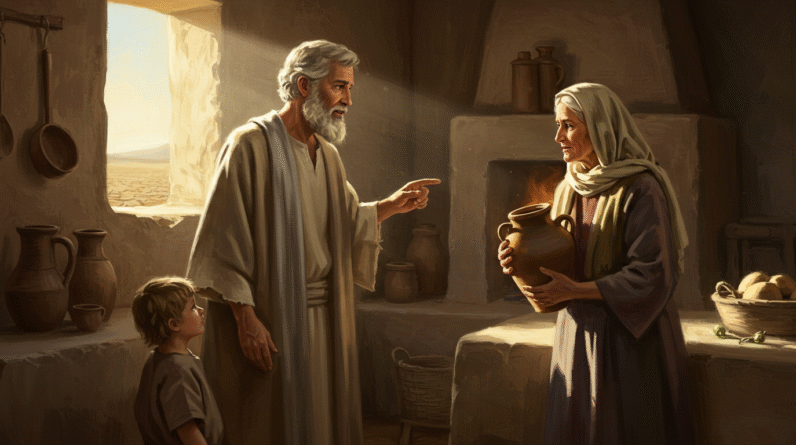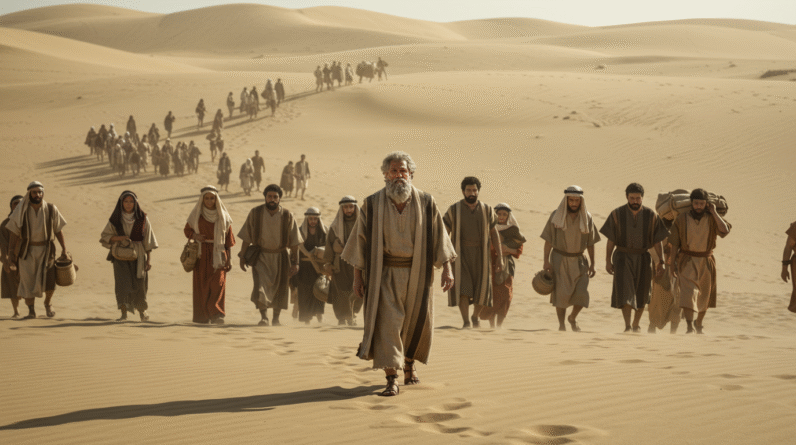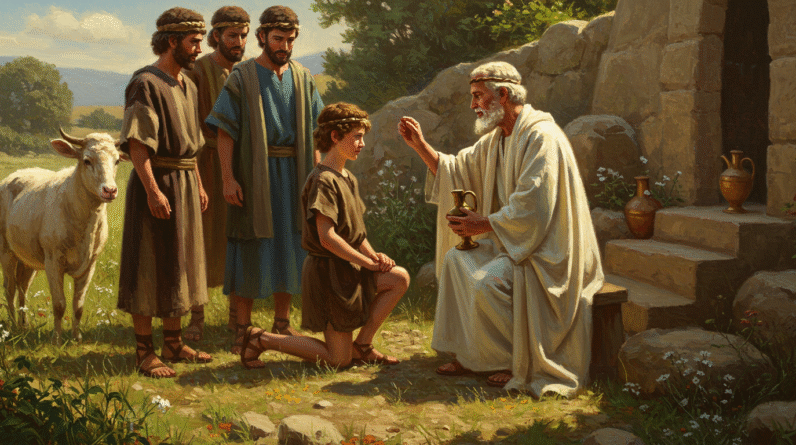Elisha and the Widow’s Oil: A Miracle of Provision in Desperation
In times of great need, when resources are scarce and hope feels distant, stories of miraculous provision can offer solace and encouragement. One such story is that of Elisha and the Widow’s Oil, as chronicled in 2 Kings 4:1-7. This tale, nestled within the pages of the Old Testament, recounts how a woman on the brink of despair found herself met with divine intervention and a surprising abundance.
Understanding the Context
Before we dive into the heart of the narrative, let’s set the stage a little. Elisha was a prophet in ancient Israel, succeeding Elijah and continuing his legacy of performing miracles and guiding the people. In this particular story, Elisha’s role is pivotal in demonstrating the power of faith and divine provision. Imagine living in a time when one’s livelihood relied heavily on agriculture and trade, when familial bonds were integral to survival. The widow in this story faced destitution after her husband’s death—her deceased husband, a prophet, had left debts that needed settling. The continuity of her life and remaining family hung in the balance.
The Widow’s Desperation
The story opens with a widow reaching out to Elisha for help. Her desperation is palpable. Her late husband had been a devoted follower of the Lord, yet his untimely death left her with insurmountable debt. Under the harsh laws of the time, the creditor was on the cusp of taking her two sons as slaves. This practice was a common but cruel resolution to debt issues in ancient Israel, emphasizing the dire straits she found herself in.
Elisha’s Response
Enter Elisha, a figure of calm and assurance. Rather than offering immediate sympathy or monetary aid, Elisha asked the widow, “What do you have in your house?” This question might seem out of place, almost dismissive of her dire situation. But it’s a strategic move to shift her focus from what she lacked to what she possessed, however meager.
The Miracle Begins: A Jar of Oil
The widow’s response was almost pitiful: “Your servant has nothing there at all,” she said, “except a small jar of olive oil.” The specificity of her mention and her minimal expectations set the stage for the unfolding miracle. Olive oil, a staple in daily life, was all she had left, and even that seemed negligible in the face of her troubles.
Elisha’s Command and the Widow’s Faith
Elisha instructed her to go to her neighbors and borrow as many empty jars as possible. The caveat? “Don’t ask for just a few.” This directive was bold, almost challenging the widow to expand her faith beyond the confines of her pressing scarcity. Perhaps she had neighbors who were generous, or maybe she was unsure if they would part with their valuable jars. Still, she obeyed, a testament to her belief and hope in Elisha’s promise.
The Act of Pouring
The next scene is intimate, almost sacred. Behind closed doors, with only her sons as witnesses, she began to pour the oil into the borrowed jars. Her solitary jar of oil didn’t run dry; instead, it overflowed, filling each empty container with abundance. This moment of repeated pouring was an act of divine multiplication, highlighting the miraculous transformation from scarcity to surplus through faith and obedience.
The Limitless Oil
The moment the last jar was filled, the oil stopped flowing. In this instant, we see a profound connection between faith and action: the miracle extended only to the capacity of the jars she collected. This wasn’t just a miracle of provision, but also a lesson in preparing to receive blessings. The widow’s effort in borrowing jars directly influenced the extent of her windfall. Here, we’re reminded that when we stretch our faith, we open ourselves up to greater potential for provision.
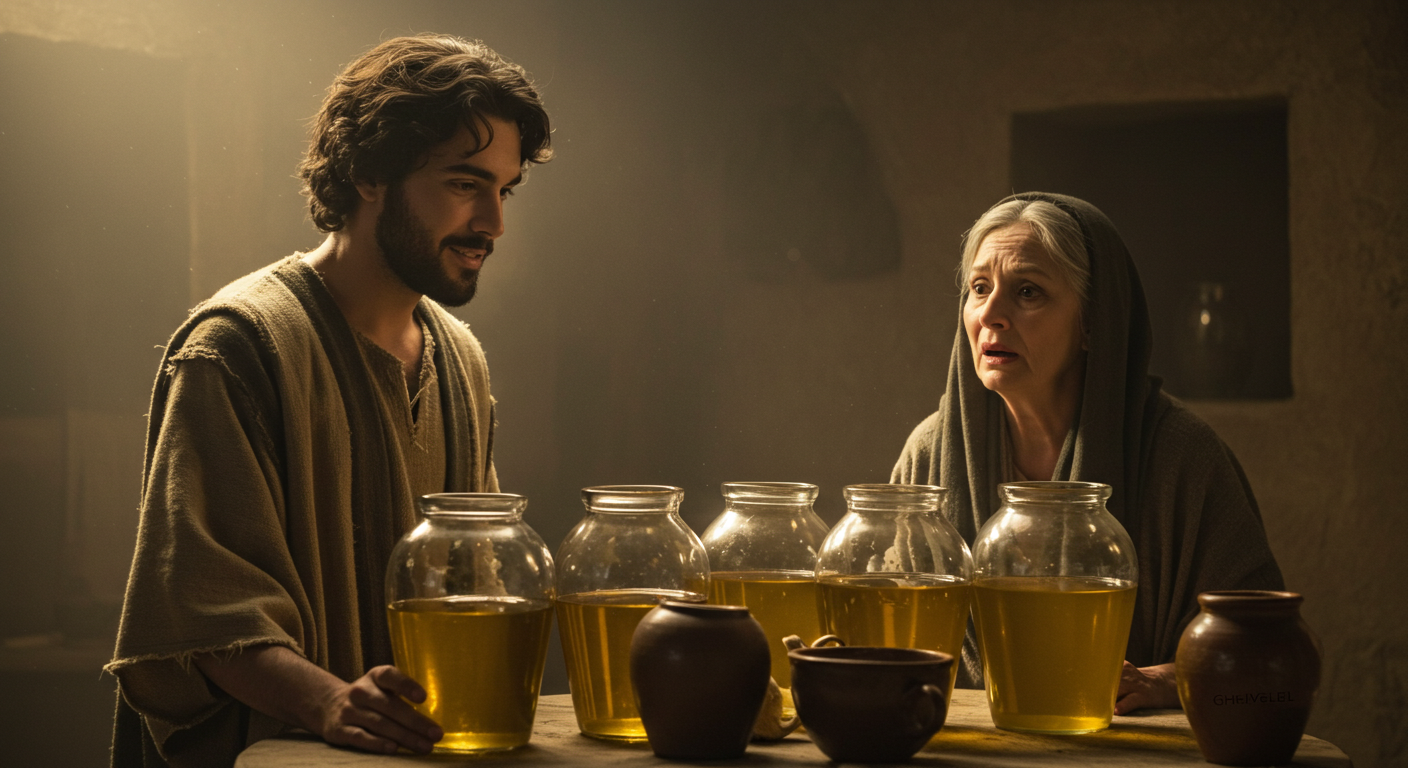
A New Beginning
Elisha’s final advice was practical—sell the oil, pay your debts, and live on what is left. It’s an ending grounded in reality, offering not just immediate relief but also a sustainable future. From the widow’s dire predicament arose a new life, made possible through faith and obedience. Her newfound financial stability ensured her sons wouldn’t become slaves, preserving her family and dignity.
The Themes of Faith and Provision
What makes the story of Elisha and the Widow’s Oil deeply resonant is its emphasis on faith leading to divine provision. In times of distress, it’s easy to get fixated on lack and limitation, yet this narrative encourages us to focus on what we have—however little—and trust that it can be multiplied beyond our imagination.
Connecting to the Modern-Day Reader
While few today are concerned about creditors taking children as slaves, financial burdens can still feel overwhelming. In moments when one’s resources seem nonexistent, drawing parallels to Elisha’s strategic questions and the widow’s acts of faith offers timeless inspiration. The story is a reassurance that even when the path forward isn’t visible, faith—paired with practical action—can pave the way for unexpected blessings.
The Multiplicative Impact of Community
An understated but vital element of the narrative is the role of community. The widow didn’t stand alone—she reached out to her neighbors for help. This highlights the power of community interdependence. Each borrowed jar was an act of collective support, emphasizing how vital community bonds can be during crises. It’s a call to both seek and offer aid whenever possible, creating a ripple effect of compassion.
Lessons in Resourcefulness
Elisha’s response inquiring about what the widow had at her disposal is a lesson in resourcefulness. It’s about looking inward and recognizing that often, what you need is already within reach. This message can resonate deeply in a world obsessed with acquiring new rather than utilizing the existing.
The Significance of Olive Oil
Olive oil, a simple household product in ancient Israel, plays a crucial role in this story. It symbolizes the ordinary turning extraordinary under divine intervention. It served not just as a commodity to be sold, but as a metaphor for how everyday items, when touched by faith, can become conduits of miracles.
The Role of Prophets
This account reiterates the role of prophets like Elisha as conduits between God and the people. Elisha didn’t perform the miracle himself; he relayed God’s instructions, making a distinction between human and divine power. It’s a testament to the belief that divine intervention can occur through chosen individuals in times of need.
Faith in the Face of Uncertainty
As we examine this miracle, a theme of faith prevailing against logic emerges. The notion of filling multiple jars from a single small jar of oil defies sensibility. Yet, faith often exists outside the realm of logic. This story captures that paradox beautifully, portraying faith as the bridge across the chasm of uncertainty.
Analogy to Modern Financial Struggles
In the modern context, financial struggles might not lead to the literal selling of children, but they can lead to significant emotional and mental stress. The principles within this narrative can guide anyone facing economic hardship: assess what you have, take actionable steps, trust in a process greater than oneself, and rely on community for support.
The Importance of Preparation
Preparation played a critical role in the widow’s miracle. Had she collected only a few jars, the outcome would have been limited. This encourages a life built on preparing to receive abundantly—having the faith to anticipate blessings and opportunities, and the wisdom to create space for them.
The Widow’s Quiet Strength
Often overshadowed by the miracle itself is the widow’s quiet strength. Her compliance with Elisha’s instructions reflects a powerful act of trust. Moving forward with confidence despite uncertainty is a potent reminder of inner resilience during hardship.
Turning Points and Divine Interventions
Stories like Elisha and the Widow’s Oil highlight divine intervention at critical life junctures. These turning points—moments when a single decision pivots one’s entire direction—underscore the themes of destiny, choice, and divine timing.
Implications for Personal Growth
Growth often arises through overcoming challenges. The widow’s journey from despair to self-sufficiency is one of transformation—an allegory for personal growth. When faced with difficulties, uncovering hidden strengths or resources can be a catalyst for profound personal development.
The Legacy of Elisha’s Miracles
Elisha’s legacy, marked by miracles, continues to inspire today. Each story, including that of the widow’s oil, speaks to timeless human experiences of lack, faith, and provision. These narratives serve as constant reminders of hope, endurance, and the extraordinary within the ordinary.
Conclusion: Embracing Faith and Action
The story of Elisha and the Widow’s Oil is more than a religious parable; it’s a universal message about the power of faith, the importance of community, and the significance of preparing to receive life’s abundant blessings. It’s a gentle reminder that, even in desperation, you must never underestimate what you have or the transformative potential of faith paired with action.
Explore More
For further reading and encouragement, check out these posts:
👉 7 Bible Verses About Faith in Hard Times
👉 Job’s Faith: What We Can Learn From His Trials
👉 How To Trust God When Everything Falls Apart
👉 Why God Allows Suffering – A Biblical Perspective
👉 Faith Over Fear: How To Stand Strong In Uncertain Seasons
👉 How To Encourage Someone Struggling With Their Faith
👉 5 Prayers for Strength When You’re Feeling Weak

📘 Jesus and the Woman Caught in Adultery – Grace and Mercy Over Judgement
A powerful retelling of John 8:1-11. This book brings to life the depth of forgiveness, mercy, and God’s unwavering love.
👉 Check it now on Amazon
As a ClickBank Affiliate, I earn from qualifying purchases.
Acknowledgment: All Bible verses referenced in this article were accessed via Bible Gateway (or Bible Hub).
“Want to explore more? Check out our latest post on Why Jesus? and discover the life-changing truth of the Gospel!”





